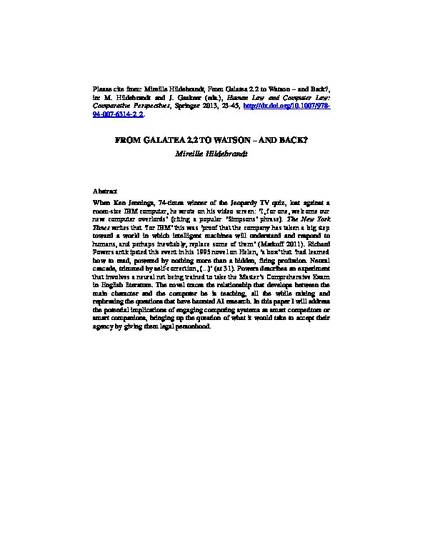
Contribution to Book
From Galatea 2.2 to Watson – and Back?
Human Law and Computer Law: Comparative Perspectives
(2013)
Abstract
When Ken Jennings, 74-times winner of the Jeopardy TV quiz, lost against a room-size IBM computer, he wrote on his video screen: ‘I, for one, welcome our new computer overlords’ (citing a popular ‘Simpsons’ phrase). The New York Times writes that ‘for IBM’ this was ‘proof that the company has taken a big step toward a world in which intelligent machines will understand and respond to humans, and perhaps inevitably, replace some of them’ (Markoff 2011). Richard Powers anticipated this event in his 1995 novel on Helen, ‘a box’ that ‘had learned how to read, powered by nothing more than a hidden, firing profusion. Neural cascade, trimmed by self-correction, (...)’ (at 31). Powers describes an experiment that involves a neural net being trained to take the Master’s Comprehensive Exam in English literature. The novel traces the relationship that develops between the main character and the computer he is teaching, all the while raising and rephrasing the questions that have haunted AI research. In this paper I will address the potential implications of engaging computing systems as smart competitors or smart companions, bringing up the question of what it would take to accept their agency by giving them legal personhood.
Keywords
- artificial intelligence,
- Watson,
- Richard Powers,
- artificial neural networks,
- Rule of Law,
- liability,
- democracy,
- machine learning,
- human mind,
- law
Disciplines
Publication Date
2013
Editor
M. Hildebrandt and J. Gaakeer
Publisher
Springer
DOI
10.1007/978-94-007-6314-2_2
Citation Information
Mireille Hildebrandt. "From Galatea 2.2 to Watson – and Back?" Human Law and Computer Law: Comparative Perspectives (2013) p. 23 - 45 Available at: http://works.bepress.com/mireille_hildebrandt/70/
